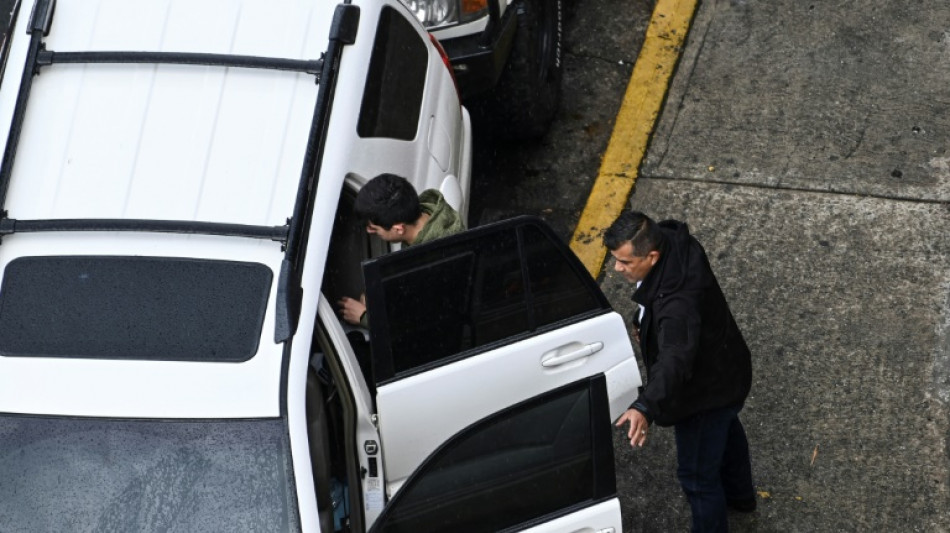
-
 Weather may delay launch of mission to study deflected asteroid
Weather may delay launch of mission to study deflected asteroid
-
China to flesh out economic stimulus plans after bumper rally

-
 Artist Marina Abramovic hopes first China show offers tech respite
Artist Marina Abramovic hopes first China show offers tech respite
-
Asian markets track Wall St rally on US jobs data

-
 Pakistan 122-1 at lunch in first England Test
Pakistan 122-1 at lunch in first England Test
-
Kazakhs approve plan for first nuclear power plant

-
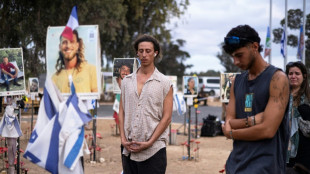 World marks anniversary of Oct. 7 attack on Israel
World marks anniversary of Oct. 7 attack on Israel
-
'Second family': tennis stars hunt winning formula with new coaches

-
 Philippines, South Korea agree to deepen maritime cooperation
Philippines, South Korea agree to deepen maritime cooperation
-
Mexico mayor murdered days after taking office

-
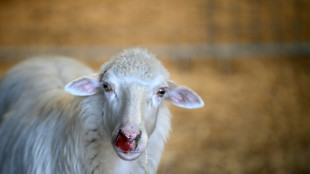 Sardinia's sheep farmers battle bluetongue as climate warms
Sardinia's sheep farmers battle bluetongue as climate warms
-
Japan govt admits doctoring 'untidy' cabinet photo
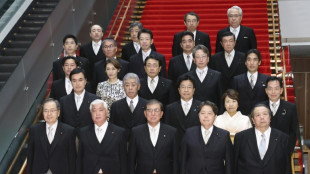
-
 Israel marks first anniversary of Hamas's October 7 attack
Israel marks first anniversary of Hamas's October 7 attack
-
Darvish tames Ohtani as Padres thrash Dodgers

-
 Asian markets track Wall St rally on jobs data
Asian markets track Wall St rally on jobs data
-
Family affair as LeBron, Bronny James make Lakers bow

-
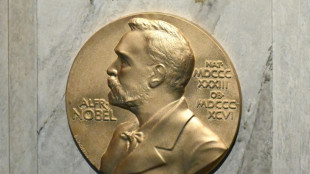 Cancer, cardiovascular drugs tipped for Nobel as prize week opens
Cancer, cardiovascular drugs tipped for Nobel as prize week opens
-
As Great Salt Lake dries, Utah Republicans pardon Trump climate skepticism
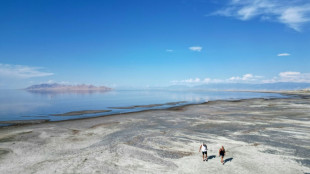
-
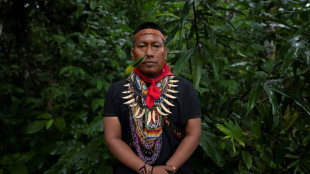 Amazon activist warns of 'critical situation' ahead of UN forum
Amazon activist warns of 'critical situation' ahead of UN forum
-
Mourners pay tribute to latest victims of deadly Channel crossing

-
 Tunisia incumbent Saied set to win presidential vote: exit polls
Tunisia incumbent Saied set to win presidential vote: exit polls
-
Phillies win thriller to level Mets series

-
 Yu bags first PGA Tour win with playoff win
Yu bags first PGA Tour win with playoff win
-
PSG held by Nice to leave Monaco clear at top of Ligue 1

-
 AC Milan fall at Fiorentina after De Gea's penalty heroics
AC Milan fall at Fiorentina after De Gea's penalty heroics
-
Lewandowski treble for leaders Barca as Atletico held

-
 Fresh Israeli strikes hit south Beirut
Fresh Israeli strikes hit south Beirut
-
Sucic stunner earns Real Sociedad draw against Atletico

-
 PSG draw with Nice, fail to reclaim top spot in Ligue 1
PSG draw with Nice, fail to reclaim top spot in Ligue 1
-
Gudmundsson downs AC Milan after De Gea's penalty heroics for Fiorentina

-
 'Yes' vote prevails in Kazakhstan nuclear plant vote: TV
'Yes' vote prevails in Kazakhstan nuclear plant vote: TV
-
'Difficult day': Oct 7 commemorations begin with festival memorial
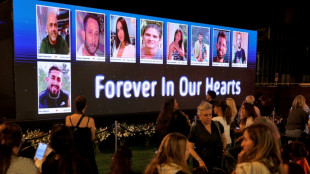
-
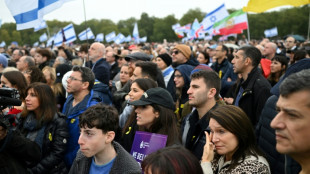 Commemorations begin for anniversary of attack on Israel
Commemorations begin for anniversary of attack on Israel
-
Lewandowski hat-trick powers Liga leaders Barca to Alaves victory

-
 'Nothing gets in way of team,' says Celtics' MVP hopeful Tatum
'Nothing gets in way of team,' says Celtics' MVP hopeful Tatum
-
India maintain Pakistan stranglehold as Windies cruise at Women's T20 World Cup

-
 'We will win!': Mozambique's ruling party confident at final vote rally
'We will win!': Mozambique's ruling party confident at final vote rally
-
Tunisia voting ends as Saied eyes re-election with critics behind bars

-
 Florida braces for Milton, FEMA head slams 'dangerous' Helene misinformation
Florida braces for Milton, FEMA head slams 'dangerous' Helene misinformation
-
Postecoglou slams 'unacceptable' Spurs after 'terrible' loss at Brighton

-
 Marmoush double denies Bayern outright Bundesliga top spot
Marmoush double denies Bayern outright Bundesliga top spot
-
Rallies worldwide call for Gaza, Lebanon ceasefire

-
 Maresca hails Chelsea's 'fighting' spirit after draw with 10-man Forest
Maresca hails Chelsea's 'fighting' spirit after draw with 10-man Forest
-
New 'Joker' film, a dark musical, tops N.America box office
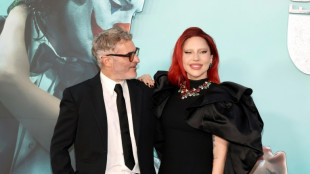
-
 Man Utd stalemate keeps Ten Hag in danger, Spurs rocked by Brighton
Man Utd stalemate keeps Ten Hag in danger, Spurs rocked by Brighton
-
Drowned by hurricane, remote N.Carolina towns now struggle for water

-
 Vikings hold off Jets in London to stay unbeaten
Vikings hold off Jets in London to stay unbeaten
-
Ahead of attack anniversary, Netanyahu says: 'We will win'

-
 West Indies cruise to T20 World Cup win over Scotland
West Indies cruise to T20 World Cup win over Scotland
-
Arshdeep, Chakravarthy help India hammer Bangladesh in T20 opener


Bodyguards a status symbol amid Venezuela's crime and poverty
In a rich neighborhood east of Caracas, a bodyguard flashes his rifle as a private armored car with dark tinted windows speeds away under his intimidating watch.
In Venezuela, one of the most violent countries in the world, having an armed escort has long been a shield against kidnapping, and worse.
Today, it is increasingly also a display of status.
In the well-to-do neighborhoods of the capital, two-car convoys of armored 4X4s without number plates are a common sight, disregarding speed limits and red traffic lights.
They zigzag through traffic with blaring sirens and flashing red and blue lights, almost like police fleet.
Some are accompanied by a motorcycle for a quick getaway, if needed.
Who is the precious cargo?
Members of Venezuela's moneyed class -- public officials or entrepreneurs, especially those colloquially referred to as the "enchufados" (plugged-ins) for their profitable business dealings, often illicit, with the government.
- 'A need for status' -
Venezuela is among the globe's top seven most violent countries, according to a World Bank report based on 2018 data.
Last year, criminals committed 8.5 murders every day, according to the Venezuela Violence Observatory, an NGO.
But the murder rate is slowly declining, from a high of 63.3 "intentional homicides" per 100,000 people in 2014 to 36.7 per 100,000 in 2018, according to World Bank figures.
Kidnapping -- one of the main causes of an explosion of private security guards and armored convoys about eight years ago -- is also on the decline, partly due to tougher police and military action against criminal gangs.
And in a country where violence has become a part of life, "the bodyguard today represents less a need for security, more a need for status," criminologist Javier Gorrino told AFP. "The more guards you have, the higher your economic and political level."
- Bag carriers -
Outside restaurants and shopping malls, it is common to see dozens of bodyguards waiting by their bosses' cars.
Some accompany their clients to the shops or hairdresser, even carry their bags.
With civilians legally prohibited from carrying firearms since 2019, the booming security trade has been a boon for police and soldiers who work part-time as bodyguards, using their service pistols -- which is legal.
They can earn "six, seven times their salary," according to Gorrino.
At the tender age of 21, Angel Pinto has left behind a paramedic career to become a bodyguard.
"I come from a family of police officers," he told AFP, and therefore "felt comfortable" with the transition that allowed principally "to earn more."
Sarkis Sako, an instructor who has been working in private security for 14 years, said a bodyguard can earn between $300 and $500 a month, compared to a beginner cop salary of about $114.
For the privilege, a bodyguard "has to be prepared to give his life for his client," said Sako, who teaches hand-to-hand combat, target shooting and other skills.
A basic protection service, with two bodyguards, will cost a client about $3,000 a month, said Sako, in a country where three in four people live in extreme poverty.
The official minimum salary in Venezuela is about $30 a month.
P.Costa--AMWN